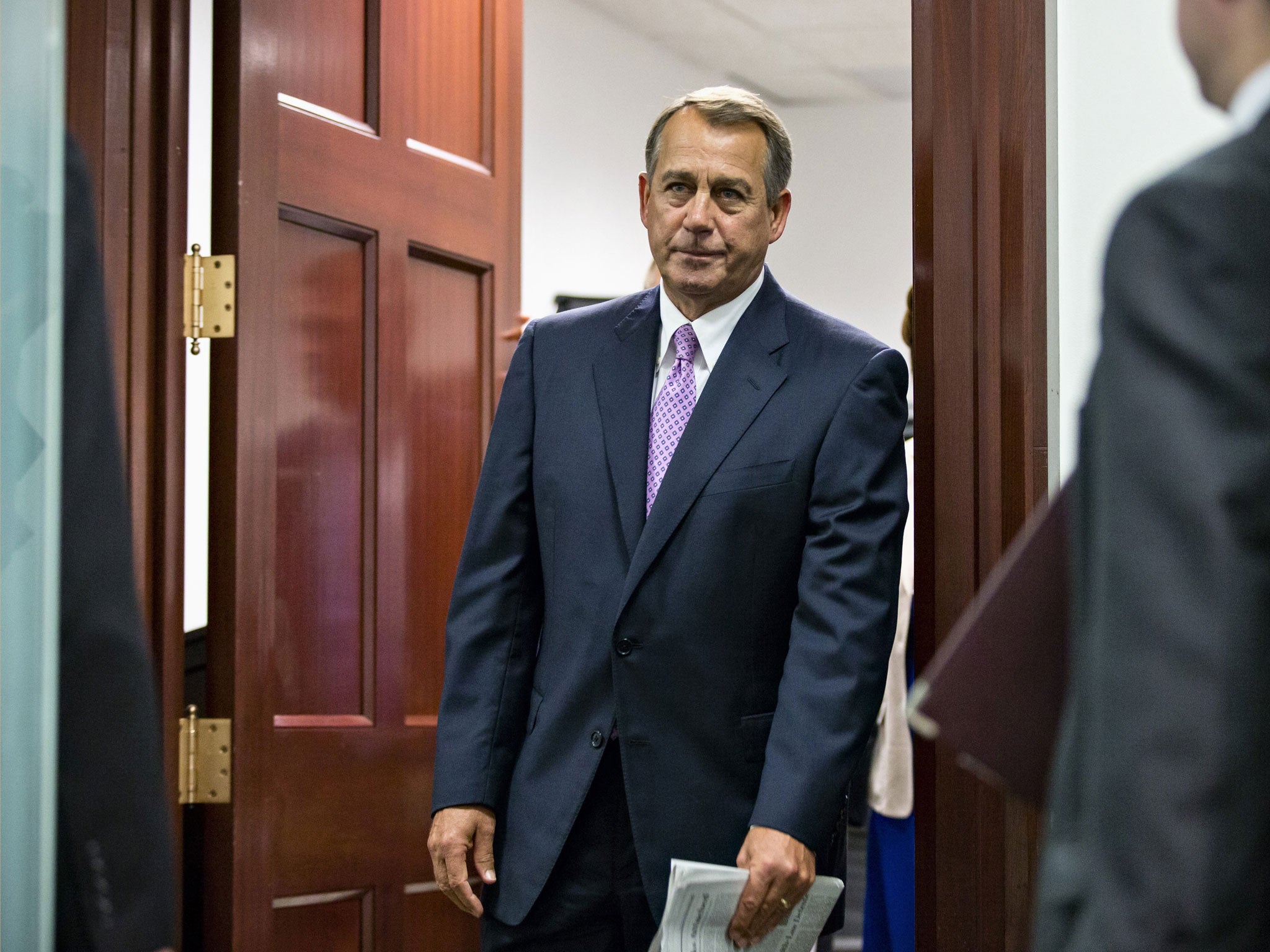No deal: Republicans and White House fail to reach agreement on short-term debt-ceiling extension
Failure of House speaker John Boehner's proposal to extend America’s borrowing means government shutdown continues

There was no quick deal between House Republicans and the White House on proposed legislation floated on Thursday by speaker John Boehner to extend America’s borrowing authority for six weeks in exchange for both sides engaging in immediate talks on overcoming the other fiscal issues that separate them.
The 18-strong Republican leadership trailed out of the White House and returned to Capitol Hill by minibus in the rain unable to announce that in an hour and a half of talks they had sold President Barack Obama on the proposal which notably did not offer any path to ending the now ten-day partial closure of the federal government.
Eric Cantor, the number two Republican and House Majority Leader, said only upon arriving back at Capitol Hill that the encounter with the president had been “clarifying” and "very useful". Trying not to sound gloomy, he added: “Our teams are going to be talking further tonight… hopefully we can see a way forward after that”.
Representative Paul Ryan said Mr Obama had said neither 'yes’ or ‘no’ to the idea.
After a day when markets jumped on the assumption that the logjam in Washington was finally breaking, the pressure on all sides to turn the Boehner proposal into something viable was tangible - for many Democrats that means attaching to it an agreement to re-open the government as soon as possible. However, that is a step that the Tea Party on the right of Mr Boehner’s party is likely to resist without major concessions.
If there is no sign of headway by first thing Friday, there are fears the markets could lose all of Thursday’s gains and then some and the terror of an American default on its debt, felt globally, would return to the fore. “After a discussion about potential paths forward, no specific determination was made,” said a White House statement. “The president looks forward to making continued progress with members on both sides of the aisle.”
But Mr Obama was possibly in the stronger position with a new poll showing more starkly than ever that ordinary voters are tending to blame Republicans most for the continuing Washington debacle far more than him. A new survey for the Wall Street Journal and NBC News finds that 53 per cent of the public fault the Republicans for the stand-off while only 31 per cent think the president is the problem. Meanwhile 70 per cent of respondents said the Republican Party was putting ideology ahead of the good of the country, a very striking number.
Mr Boehner would have to put legislation to the floor enshrining his proposed six-week raising of the debt ceiling, but there is no guarantee he would find the votes. In theory, he could do so as early as Friday. Were it to pass, the bill would then go the Senate. But the majority leader of the upper chamber, Democratic senator Harry Reid, made clear he would not support any solution that does not include re-opening the government.
Earlier Thursday, Treasury Secretary Jacob Lew warned the Senate Finance Committee that a failure to renew the government’s ability to borrow money “could be deeply damaging to the financial markets, the ongoing economic recovery and the jobs and savings of millions of Americans”. It would also leave the Treasury with the almost impossible task of deciding who gets paid form what money is left and who doesn’t.
“The United States should not be put in a position of making such perilous choices for our economy and our citizens,” Secretary Lew attested, saying the government might for instance have to halt pension or healthcare payments for the elderly. “I don’t believe there is a way to pick and choose on a broad basis.”
Mr Lew said he would clearly prefer a solution spanning far beyond the four to six weeks that Republicans seemed to be talking about. “Our view is this economy would benefit from more certainty and less brinksmanship. So the longer the period of time is, the better for the economy,” he said.
Subscribe to Independent Premium to bookmark this article
Want to bookmark your favourite articles and stories to read or reference later? Start your Independent Premium subscription today.

Join our commenting forum
Join thought-provoking conversations, follow other Independent readers and see their replies